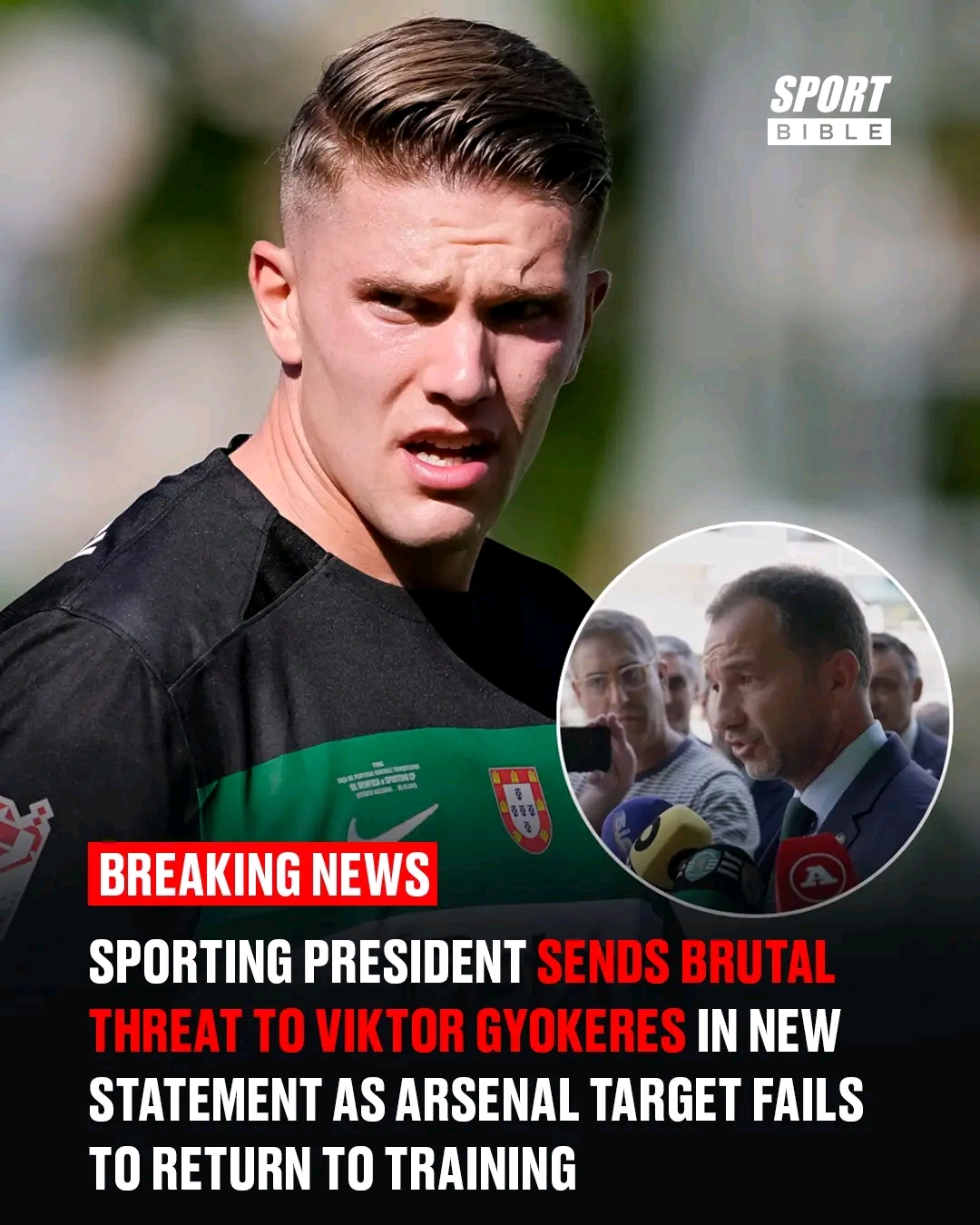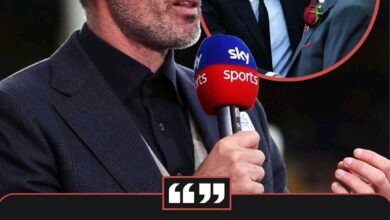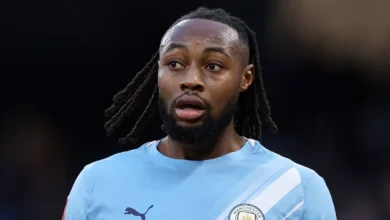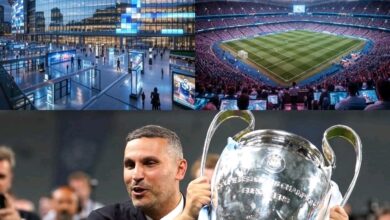Viktor Gyokeres Transfer Saga: A Comprehensive Analysis of Sporting’s Standoff with Arsenal Target

The football transfer market is often characterized by high-stakes negotiations, power plays, and dramatic standoffs between clubs and players. One such situation has emerged involving Viktor Gyokeres, the Swedish striker who has become one of Europe’s most sought-after forwards. The 27-year-old’s relationship with Sporting Clube de Portugal has reached a breaking point, with the club’s president issuing stern warnings while the player reportedly refuses to return to training in pursuit of a move to Arsenal.
This developing saga represents more than just a typical transfer dispute; it embodies the complex dynamics of modern football, where player power, club authority, and market forces collide in spectacular fashion. The situation has captured the attention of football fans across Europe, particularly those supporting Arsenal, who see Gyokeres as a potential solution to their striker needs.
Viktor Gyokeres’ journey to becoming one of Europe’s most coveted strikers has been anything but conventional. Born in Stockholm, Sweden, the towering forward’s career trajectory took him through various leagues and experiences before establishing himself as a prolific goalscorer at Sporting CP. His physical presence, combined with technical ability and an eye for goal, has made him a standout performer in the Portuguese league. The striker’s development has been marked by persistence and gradual improvement. After struggling to make an impact during earlier career phases, Gyokeres found his rhythm in Portugal, where the style of play and tactical approach seemed to suit his attributes perfectly. His performances for Sporting have not gone unnoticed, with scouts from top European clubs regularly monitoring his progress.
What makes Gyokeres particularly attractive to Premier League clubs is his combination of physicality and technical skill. Standing at an imposing height, he possesses the aerial ability that many English clubs value, while his movement in the box and finishing ability have proven consistent in high-pressure situations. His goal-scoring record speaks for itself, with impressive numbers that have caught the attention of Arsenal’s recruitment team.
Arsenal’s pursuit of Gyokeres represents a significant shift in their transfer strategy under Mikel Arteta. The Gunners have been searching for a reliable striker who can provide the clinical edge needed to compete at the highest level. With their current attacking options showing inconsistency in front of goal, the addition of a proven goalscorer like Gyokeres could transform their offensive capabilities.
The North London club’s interest in the Swedish international is not merely opportunistic; it reflects a carefully planned approach to addressing their squad’s needs. Arsenal’s scouts have been tracking Gyokeres for an extended period, analyzing his performances and assessing his suitability for the Premier League. The striker’s physical attributes and playing style align well with Arteta’s tactical preferences, making him an ideal candidate for the Arsenal system.
Financial considerations also play a crucial role in Arsenal’s pursuit. The club has been operating under tighter financial constraints in recent years, making strategic acquisitions essential. Gyokeres represents value in the current market, offering proven quality at a price point that aligns with Arsenal’s budget considerations. The potential return on investment, both in terms of on-field performance and commercial value, makes this transfer particularly attractive. The current crisis between Gyokeres and Sporting CP did not emerge overnight. Tensions have been building over several weeks, with the player’s representatives reportedly expressing frustration at the club’s handling of transfer negotiations. The situation reached a tipping point when Gyokeres failed to report for pre-season training, a decision that has escalated the conflict significantly.
From the player’s perspective, the failure to return to training represents a calculated risk designed to force Sporting’s hand. This strategy, while controversial, has become increasingly common in modern football, where players use their market value as leverage in transfer negotiations. Gyokeres and his representatives likely believe that his commercial value to Sporting makes him indispensable, giving them negotiating power. However, this approach has clearly backfired in terms of public relations and club relationships. Sporting’s hierarchy has interpreted the player’s absence as a direct challenge to their authority, prompting a robust response from president Frederico Varandas. The public nature of this dispute has added another layer of complexity, as both parties now face pressure to maintain their positions while finding a resolution
Sporting president Frederico Varandas has taken a firm stance in response to Gyokeres’ training boycott, demonstrating that the club will not be intimidated by player power tactics. His statement to Agencia Lusa was notably direct and uncompromising, sending a clear message that Sporting will not be bullied into accepting unfavorable transfer terms.
Varandas’ approach reflects a broader philosophy about club management and player relations. By threatening significant fines and demanding a public apology, he is establishing clear boundaries about acceptable behavior while protecting the club’s interests. This stance is particularly important for Sporting, as acquiescing to player demands could set a dangerous precedent for future negotiations.
The president’s comments about being “comfortable” with keeping Gyokeres for the remaining three years of his contract reveal the club’s strong negotiating position. Unlike clubs facing immediate financial pressure, Sporting can afford to hold firm on their valuation, knowing that the player’s value may continue to appreciate. This patience gives them significant leverage in negotiations with potential suitors.
The financial aspects of this transfer saga are complex and multifaceted. Sporting’s insistence on receiving “fair market value” for Gyokeres reflects their understanding of the player’s worth in the current market. The club has invested significantly in the striker’s development and expects a return commensurate with his abilities and potential. For Arsenal, the financial calculation involves more than just the transfer fee. The club must consider wages, agent commissions, and potential performance-related bonuses when evaluating the total cost of acquisition. Additionally, the risk of overpaying for a player who may struggle to adapt to the Premier League represents a significant concern for the club’s financial planners.
The broader football economy also influences these negotiations. With inflation affecting transfer fees across the board, clubs are increasingly cautious about their spending. Arsenal’s approach to this transfer will be closely scrutinized by their supporters and the media, as it reflects the club’s ambition and financial management under current ownership.
Gyokeres’ situation highlights the growing influence of player power in modern football. The striker’s decision to boycott training represents a calculated use of his market value to influence transfer negotiations. This approach has become increasingly common as players and their representatives recognize the leverage they possess in the current market.
The effectiveness of such tactics depends largely on the player’s value to their current club and the strength of their negotiating position. In Gyokeres’ case, his goal-scoring record and market appeal provide significant leverage, though Sporting’s firm response suggests that clubs are becoming more resistant to such pressure tactics. This dynamic reflects broader changes in football’s power structure, where traditional club authority is being challenged by player representation and market forces. The outcome of this particular dispute may influence how similar situations are handled in the future, making it a case study for the evolving relationship between clubs and players
Sporting’s handling of the Gyokeres situation reveals a sophisticated understanding of transfer negotiations and public relations. By taking a firm public stance, the club is not only protecting its immediate interests but also sending a message to other players and their representatives about the consequences of challenging club authority.
The club’s willingness to impose financial penalties and demand public apologies demonstrates their commitment to maintaining discipline and respect within the organization. This approach may be costly in the short term, particularly if it prevents a potentially lucrative transfer, but it establishes important precedents for future negotiations. Sporting’s confidence in their negotiating position stems from their understanding of Gyokeres’ value and the competitive market for his services. With multiple clubs reportedly interested in the striker, the Portuguese club can afford to be selective about potential suitors and transfer terms.
Arsenal’s pursuit of Gyokeres represents a significant strategic decision that extends beyond immediate squad needs. The club’s recruitment team has identified the striker as a key component of their long-term planning, making his acquisition a priority despite the current complications.
The Gunners’ approach to this transfer will be influenced by their broader strategic objectives, including their desire to return to Champions League football and compete for major trophies. Gyokeres’ profile as a proven goalscorer makes him an attractive option for achieving these ambitions, even if the current situation presents challenges.
Arsenal’s management must also consider the implications of engaging in a public transfer battle. The club’s reputation and future negotiating position could be affected by how they handle this situation, making diplomatic and strategic considerations as important as sporting ones.
The Gyokeres situation unfolds against the backdrop of a rapidly evolving transfer market. Financial Fair Play regulations, changing economic conditions, and shifting competitive dynamics all influence how clubs approach player acquisitions. Understanding these broader trends is essential for contextualizing the current dispute.
The timing of this transfer saga is particularly significant, as it occurs during a period of increased scrutiny on football finances. Clubs are under pressure to demonstrate responsible spending while maintaining competitive squads, creating tension between sporting ambition and financial prudence. Market inflation has also affected transfer valuations, with clubs increasingly cautious about overpaying for players. This environment makes negotiations more complex and potentially more contentious, as seen in the Gyokeres situation.
Several potential outcomes could emerge from this complex situation. The most straightforward resolution would involve Arsenal meeting Sporting’s valuation and completing the transfer, though this outcome seems unlikely given the current tensions. Alternative scenarios include other clubs entering the race, Gyokeres eventually returning to Sporting, or a compromise solution that satisfies all parties. The resolution of this dispute will likely depend on various factors, including Arsenal’s willingness to increase their offer, Sporting’s flexibility on their valuation, and Gyokeres’ commitment to his current stance. External pressures, such as the approaching start of the season and other transfer opportunities, may also influence the eventual outcome.
The Viktor Gyokeres transfer saga represents a fascinating case study in modern football dynamics. The situation highlights the complex interplay between player power, club authority, and market forces that characterizes contemporary transfer negotiations. As this story continues to develop, it will undoubtedly influence how similar situations are handled in the future.
For Arsenal, the pursuit of Gyokeres represents both an opportunity and a challenge. The striker’s abilities could significantly enhance their attacking options, but the current complications require careful navigation to avoid damaging their reputation and future negotiating position.
Sporting’s firm stance demonstrates the importance of maintaining authority and protecting club interests in an environment where player power is increasingly influential. Their approach may serve as a model for other clubs facing similar challenges.
Ultimately, this saga reflects the evolving nature of football’s transfer market, where traditional relationships and power structures are being redefined. The resolution of this particular dispute will provide valuable insights into the future direction of player-club relations and transfer negotiations in the modern game.
The coming weeks will be crucial in determining how this situation unfolds, with implications extending far beyond the immediate interests of the parties involved. As football continues to evolve, cases like this will shape the landscape for future generations of players, clubs, and supporters.















